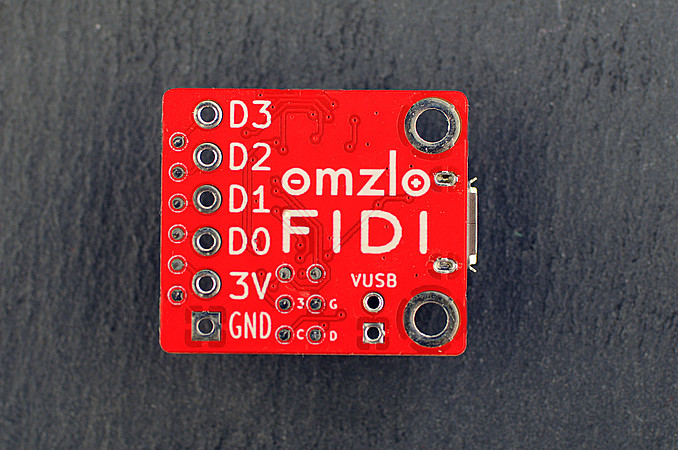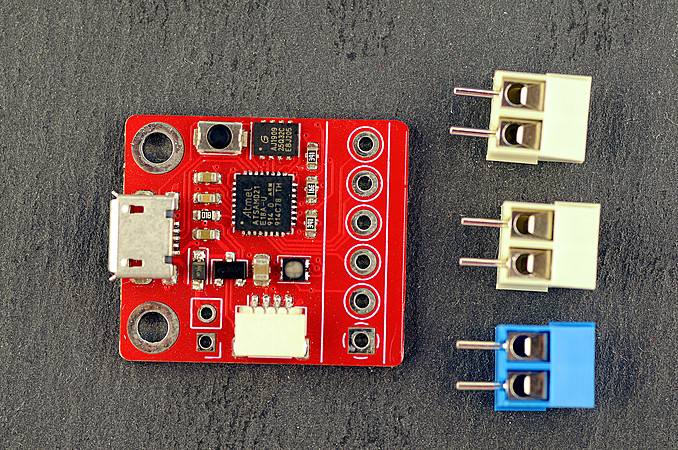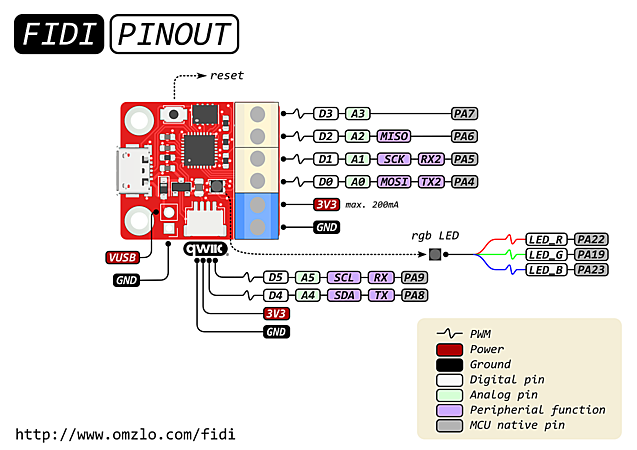Presentation
FIDI is a small development board running Adafruit's CircuitPython, featuring 6 terminal block connectors and a qwiic connector, designed for fast prototyping. It runs on the ATSAMD21 microcontroller, a 32-bit Arm Cortex M0+ clocked at 48Mhz, as found on many popular Arduino-compatible boards.
Though FIDI only features 6 GPIOs, they can be configured as digital or analog IOs, SPI, I2C, UART, or a combination thereof. Four of those GPIOs are available through terminal block connectors, allowing connections with a simple screwdriver. The two remaining GPIOs are available on a four-pin JST-SH connector, in an arrangement that is fully compatible with Sparkfun's qwiic connector system (also called STEMMA QT by Adafruit). This allows you to quickly test sensors and other circuits without any soldering.
Thanks to CircuitPython, writing code for FIDI is super simple. Once connected to a computer with a simple USB micro connector, FIDI shows up as a USB drive where you can drag-and-drop or edit your python code.
FIDI is open-source hardware. In fact, it's a derivative of Arturo182's excellent SERPENTE. The main difference between SERPENTE and FIDI is the connectivity, with FIDI featuring Micro USB, 3.5mm terminal blocks, and JST connectors. On the software side, FIDI is 100% compatible with SERPENTE. Please note that OMZLO is not affiliated with SERPENTE or its author Arturo182.
Technical details
The main technical features of the board are:
- A small size: it measures 25.4mm x 22mm (1" x 0.86")
- Microchip ATSAMD21E18A 32-bit Arm Cortex M0+ running at 48MHz, with 256KB flash, and 32KB RAM
- 4MB flash for CircuitPython code and other files,
- Six GPIOs, featuring SPI, I2C, UART, Digital/Analog IO, PWM, ...
- 3.5mm terminal block connectors and one 4 pin JST-SH connector (qwiic).
- 3.3V logic level, maximum 200mA
- USB micro connection to PC
- User-controlled RGB LED
The pinout of the board is shown below.
The back of the board is shown here.

Using the board
FIDI comes preloaded with CircuitPython 5, so you can get going immediately. Thanks to the UF2 bootloader, you can easily upgrade your board to the latest version of CircuitPython at any time following the instructions provided here by Adafruit.
Adafruit provides an extensive guide for CircruitPython.
FIDI use case examples are available here to help you getting started, showing how to blink an LED, read analog inputs and get data from a sensor over I2C.
What's included
The FIDI board is provided fully assembled except for the 3 terminal blocks that need to be soldered to the board, as shown in the picture below.

The 3 terminal blocks should be first connected to each other, using the tiny slots on their sides. The blue terminal block should be positioned so as to fit on the bottom lower pins of the board, next to the qwiic connector, as shown on the various pictures above. Once they are connected and perfectly aligned, the terminal blocks can be soldered to the board.
We can solder the terminal blocks for you before shipping, for a small extra fee (see product options).
You will need to provide your own Micro-USB cable to connect the board to a computer.
Links to code and documentation
Shipping policy
We ship twice a week, typically on Tuesdays and Fridays.






